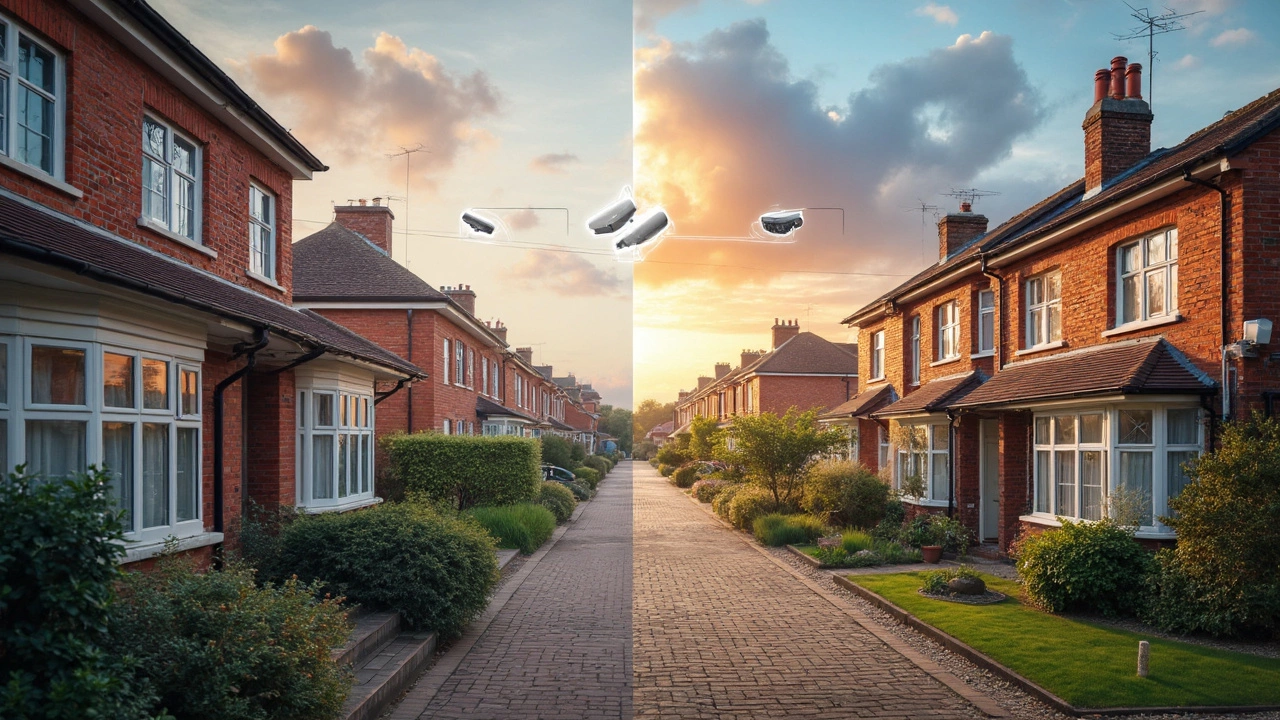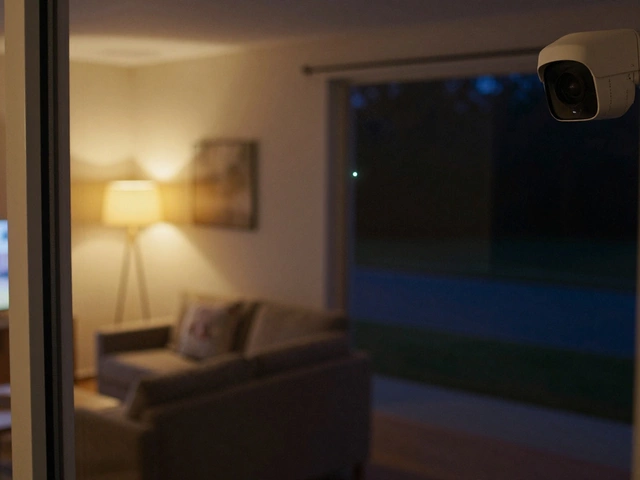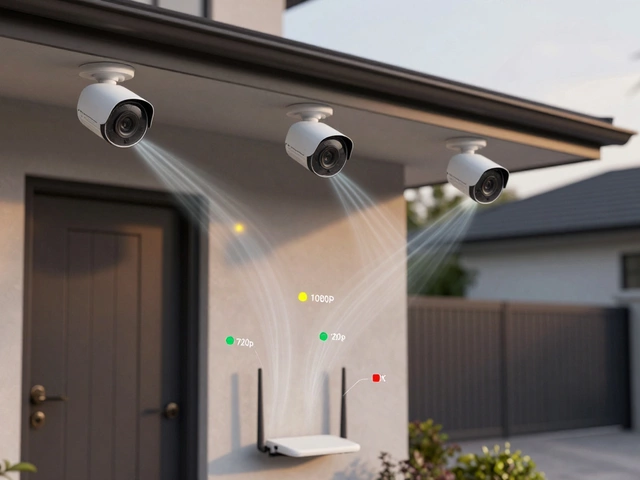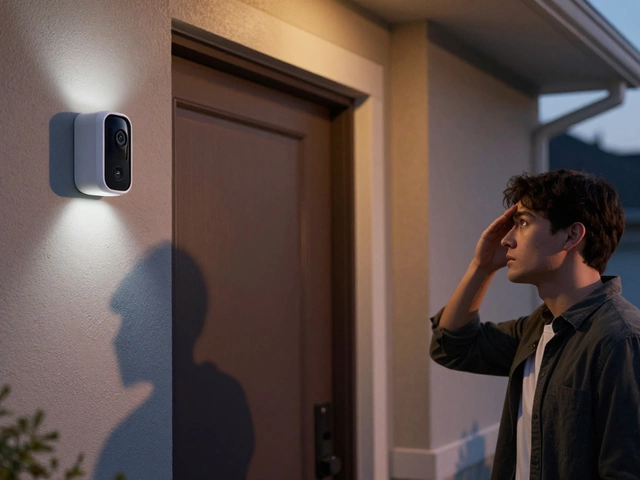Alright, you're thinking about setting up CCTV at your place, right? Cool. But here's the thing—you've got a choice to make. Wired or wireless? Each has its own quirks, costs, and benefits.
So, why go for wired? Well, these babies give you solid, reliable footage without those 'dang, where's the signal?' moments. But there's more to it. Installation can be a pain in the neck. You've got cables to deal with, drilling, maybe even a helping hand. It's not just about slapping it on a wall.
On the flip side, wireless cameras are as easy as pie to set up. No cables, just a couple of screws and you're good to go. But keep in mind, they rely on your Wi-Fi. If your connection's dodgy, your footage might go south too. And hey, these aren't your only considerations. Let's dig deeper and figure out what suits you best.
- Wired CCTV: Pros and Cons
- Wireless CCTV: Pros and Cons
- Comparing Costs: Wired vs Wireless
- Installation Challenges
- Security and Reliability
- Making the Right Choice
Wired CCTV: Pros and Cons
So, you're leaning towards getting a wired CCTV system. Here's the lowdown. These systems are known for their rock-solid reliability. Why? Well, they don’t rely on Wi-Fi or external signals. You'll get uninterrupted, clear footage, which is crucial when you need evidence for any incident or mishap.
On top of that, wired systems can support more cameras without suffering from lag or interference. It's like having landlines—they're just dependable. Plus, you won’t sweat over replacing batteries since they're constantly powered through electrical wiring.
Now, here's the flip side. The installation can be a bit of a project. It's not something you knock out in an hour. You'll need to run cables through walls and maybe even do a bit of drilling. Depending on how many cameras you're installing, it can get pretty time-consuming and you might need a pro, which can up the installation cost.
Let's talk about the aesthetic factor. Cables can be a mess unless you conceal them properly, and that might require some additional work. Also, once it's set up, it's set. Moving cameras around or upgrading the system might mean you have to deal with those wires again, which is a hassle not everyone loves.
There's also the initial price tag. Wired systems can be pricier due to the additional gear and installation labor. But think about it; if you want lifelong security with less worry of tech hiccups, maybe it’s a price worth paying. In fact, here's a simple comparison of what you might expect for installation costs:
| Component | Estimated Cost |
|---|---|
| Basic Camera Unit | $50 - $250 each |
| Installation per Camera | $100 - $200 |
| Wiring & Accessories | $50 - $100 |
| Total for 4 Cameras | $800 - $1,600 |
Now that you’ve got the facts on wired systems, you can weigh these pros and cons against your needs and see if going the wired route is your best bet.
Wireless CCTV: Pros and Cons
Thinking about going wireless for your security cameras? Let's break down what it means. First off, the most obvious perk—it’s easy to install. No need for a professional team to run cables all over your house. Just find a good spot, screw it in, and connect it to your Wi-Fi. Done and dusted!
Another plus is flexibility. Moving house? No problem. Simply unmount your cameras and set them up at the new place without leaving a single hole behind. They're perfect for renters or if you like rearranging your setup every few years.
Now, about the flip side. Your wireless CCTV lives and dies by your Wi-Fi. Spotty internet means patchy coverage, and you don’t want your cameras cutting out at crucial moments. So, make sure your network is strong enough to handle a bunch of devices working 24/7.
- Pros: Easy to install, portable, minimal/no cabling, great for temporary setups.
- Cons: Dependent on internet, possible interference, might have range limitations.
Oh, and another heads-up—these systems might be easier to hack if they're not properly secured. Always keep your software up-to-date and use strong passwords to minimize risks.
In short, wireless CCTV is super convenient and versatile, just make sure your Wi-Fi can keep up with its demands. Weighing these pros and cons will help you figure out if it fits your budget and security goals.
Comparing Costs: Wired vs Wireless
When it comes to setting up CCTV, understanding the costs between wired CCTV and wireless CCTV is crucial. Each comes with its own budget considerations. Let's break it down.
First off, wired systems might seem a bit daunting because of the initial price hike. You're looking at a bigger upfront investment mainly due to labor costs. Running cables and installing them isn't a one-man job, and you'll probably need a pro for a clean setup. This can set you back anywhere from $150 to $200 per camera, depending on how intricate the layout of your place is.
Now, once they're in, wired systems are pretty low-maintenance. No batteries to charge and no surprise outages due to dead batteries. You might save in the long run because they seldom need touch-ups or replacement parts.
Wireless systems look more budget-friendly at first glance. You can buy a decent wireless camera for $100-$150, and since there's no need for crazy cabling, you could skip the pro installer fees. However, there's a catch—you might end up spending more over time on things like replacement batteries or tech upgrades to handle increased data loads if your network struggles.
Plus, depending on the features and coverage you want, some wireless cameras need a subscription for cloud storage. Those monthly fees can add up, so factor that into your budget.
Here's a quick snapshot to give you a clearer idea:
| Expense | Wired CCTV | Wireless CCTV |
|---|---|---|
| Initial Setup Cost | $150-$200 per camera | $100-$150 per camera |
| Installation Labor | Required | Optional/self-install |
| Ongoing Costs | Low | Medium (batteries, potential subscriptions) |
In the battle of CCTV installation cost, it's a bit of a balancing act. If you prefer a stable, long-term option and don't mind the initial hassle and outlay, go wired. But if you want something less invasive and are okay with keeping an eye on battery life and potential upgrades, wireless might be your pick.

Installation Challenges
So, you've settled on bolstering your home's security with CCTV—good on you! But hold up, the real hurdle isn't buying the cameras; it's setting them up right. Let's break down the challenges of getting those security eyes to do their job.
Wired CCTV systems, while known for their excellent reliability, can be a bear to install. Why? It's the wires. Running these all over your home isn't just a hassle; it's a project. You're looking at drilling through walls, ceilings, and maybe even floors to keep cables tucked away nicely. And unless you're a DIY master, you might end up shelling out some serious cash for professional installation, which can noticeably impact the overall CCTV installation cost.
Then there's the planning stage. You’ll need to meticulously plan the cable paths beforehand. Plus, consider the distance; the farther the cameras are from the recording setup, the more feet of cabling you'll need—and yes, that can drive up costs as well.
Now, if you're going the wireless CCTV route, your job's made a bit simpler. These systems require little to no invasive installation since they're devoid of cables. No fuss or drilling necessary here. But hold your horses, because you might face other issues—like ensuring that your Wi-Fi signal is strong enough to support the cameras, especially if they're outside. Dodgy internet can mean lost footage, which is kind of the opposite of what we're going for with security cameras.
Got a big yard? A detached garage? Check your Wi-Fi reach before getting comfy. Sometimes you might need to invest in signal boosters, which can add to your overall cost.
So, wired or wireless, both have their set of bumps in the road. But being prepared and knowing what you're up against can ease the process quite a bit, and ensure your security setup fits right in with your lifestyle and budget.
Security and Reliability
When you're setting up CCTV at home or in your business, security is the name of the game. You want a setup that isn't going to let you down. So, how do wired and wireless CCTV stack up in this department?
Let's start with wired systems. They shine when it comes to reliability. Since they're connected through cables, you're less likely to run into those annoying signal drops. If your internet goes out, a wired CCTV keeps running without a hitch. Plus, they're generally harder to hack. Someone would have to physically cut the cables to disrupt the system.
Now, about wireless CCTV—it's super convenient but can be a bit of a mixed bag if we're talking stability. These systems depend heavily on your Wi-Fi connection. So, if you live in an area with flaky internet, you might experience some interruptions. Plus, there's always that potential risk of hacking since they communicate over your network. Keeping your network secure and regularly updating your camera firmware can help mitigate these risks.
But hey, it's not all doom and gloom for wireless fans. They're getting better, thanks to new technology. Stronger encryption protocols and dual-band Wi-Fi support help them stay secure and stable.
Choosing between wired and wireless is about balancing what matters most to you: the rock-solid dependability of wired systems or the versatility and ease of use with wireless. Remember, whatever you pick, regular maintenance and updates are key to keeping any CCTV system reliable and secure.
Making the Right Choice
Alright, let's cut to the chase. How do you choose between wired and wireless CCTV? It really boils down to your specific needs and lifestyle.
If you crave rock-solid reliability and have the patience to deal with some wires, then wired systems might be your best bet. They're less susceptible to interference, which means fewer lost signals and more dependable recordings. Plus, they're typically not as easy to hack. But beware, these systems might dent your budget with higher installation costs.
On the flip side, if you're renting or just hate the idea of tangled wires, wireless you go. They're easy-peasy to install—just mount and connect to Wi-Fi. Keep in mind though, while installation costs are lower, you might deal with issues like connectivity hiccups and battery replacements.
Think about the size of your property too. Large spaces might require a robust wired setup, while smaller places can get by with just a couple of wireless cameras.
Here's a quick comparison to help you:
| Aspect | Wired CCTV | Wireless CCTV |
|---|---|---|
| Installation | Complex, possibly professional | Simple, DIY-friendly |
| Reliability | Highly reliable | Depends on Wi-Fi |
| Cost | Higher upfront | Lower upfront |
| Scalability | Challenging | Easy |
Ultimately, it's about balancing costs, convenience, and security. Remember, the best choice isn't about going big or pricey—it's finding what works best for your situation. Consider your comfort with technology, the layout of your home, and your budget. Whatever you choose, make sure it brings you peace of mind.




